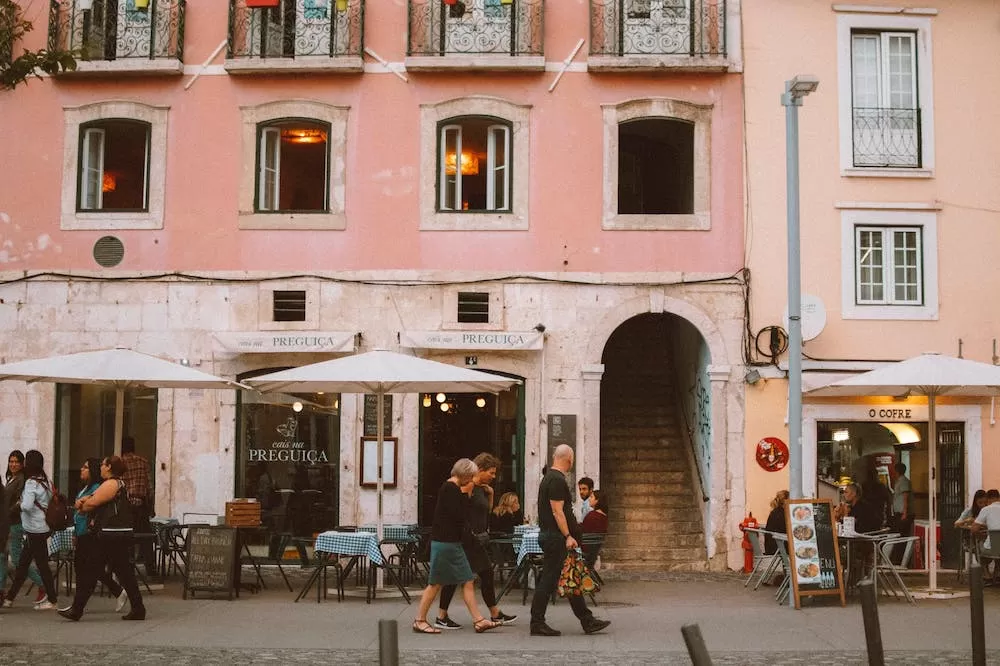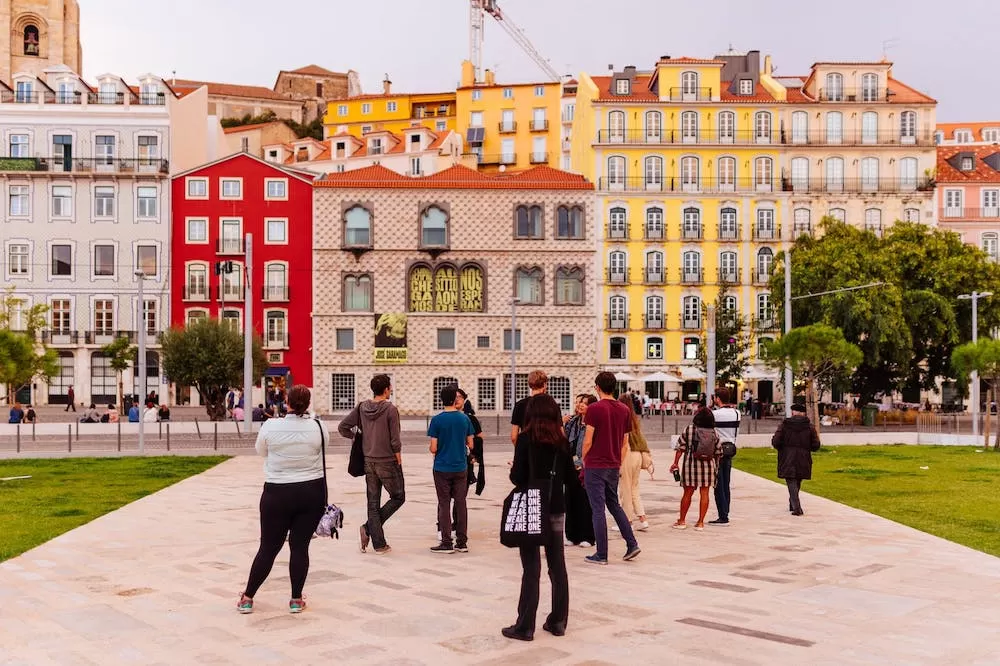As far as capital cities go,
Lisbon is far from the most popular in the world. Most especially when compared to the likes of Paris, Rome, London, and more. In truth, however, that doesn't matter at all. The Portuguese capital remains one of the finest cities to live in, arguably even more so than the aforementioned metropolises. People can flourish and enjoy life here, all while not getting as stressed as they would be in other capital cities. But what does it really mean to relocate here? What will you need to know and what to do? This relocation guide will help you!
How to Move to Lisbon
Moving to Lisbon—or Portugal in general—is pretty straightforward. It's basically a three-step process:
1. Apply for a long-term Portuguese visa (valid passport for EU/EEA citizens)
2. Get proper accommodations
3. Find a means of livelihood
Though it all seems simple, each process requires a lot of effort. It's also better that you know a lot more about Lisbon before you relocate here.
Is It Hard to Move to Portugal?
It depends on your current situation. It's a lot easier to move to Portugal when you have a good reason to relocate here. The most common reasons are that your work relocated you to the country or you plan to continue your studies at a Portuguese university. Though it's still possible to move to Lisbon (or any other part of Portugal) without a job, you have to meet certain requirements instead. And even if you meet them, the relocation process will still require a lot of paperwork.
Is Lisbon a Good Place to Live?
It's safe to say that it is. The cost of living and crime rates in Lisbon are low, guaranteeing a largely affordable and safe lifestyle. Who wouldn't want to live in such a city?
Lisbon Overview
Lisbon serves as the capital city of Portugal. It's also the largest city in the country, with a current population of around 3,001,000 residents. Since it's in the Mediterranean, the city is known for its warm climate all year round. Lisbon's hottest month is August, which has an average temperature of 23.6°C (75°F). On the flip side, the city's coldest month is January, which has an average temperature of 14.3°C (57.74°F). Even in winter, Lisbon remains as warm and as sunny as ever.
Why Visit Lisbon?
Well, why not? Lisbon is a lively city that's always sunny and bright. Even just
a day in Lisbon will warm you up even more than when it's spring in Scandinavia, for example. The Portuguese capital is also a beautiful metropolis. Explore Alfama, the city's old town district, and get lost in all the historic glamour. See the classical structures like Torre de Belém, St George’s Castle, and the Palace of the Marquises of Fronteira. Or experience local life in Bairro Alto, where you can spend the day drinking coffee outside, dancing with locals, and more.
What is Lisbon, Portugal Known For?
Apart from being Portugal's capital city, Lisbon is also known for its historic sites, colorful azulejos (ceramic tiles), delicious food, and of course, that signature eternal sunshine. The city's elevator trams are also quite novel, becoming just as popular as the major tourist attractions.
Where is Lisbon Located?
Lisbon is located on the mid-western coast of Portugal. The city, like the country of
Portugal itself, is right on the edge of the Iberian Peninsula.
Source: Wikimedia Commons
Visa in Lisbon
The first step to moving to Lisbon—or anywhere else, for that matter—is to get a visa. If you're a non-EU/EEA citizen, you need to apply for a long-term
Schengen Visa to get to Portugal. But if you're an EU/EEA citizen, all you need is a valid passport to enter the country. After five years of staying here, you can then apply for a permanent residence permit to live in Lisbon.
Do I Need a Visa for Lisbon, Portugal?
As already mentioned, non-EU/EEA citizens are required to apply for a visa to get to Portugal and stay here for at least three months. There's also the
ETIAS Visa Waiver Program, which allows citizens of select countries to enter the Schengen Area (including Portugal) without a visa. They include the US, the UK, the UAE, Canada, Australia, Japan, Singapore, Israel, and more.
Visa Requirements for Lisbon, Portugal
The complete list of requirements to apply for a long-term Schengen Visa may vary from country to country. However, the list includes a few general requirements that are the same across the board. They include
- A valid passport
- Application form
- Proof of itinerary
- Proof of financial means
- Proof of accommodations
- Proof of employment
- Proof of enrollment (for students)
- Proof of paid visa fee
- Travel medical insurance
How to Get a Visa to Live in Portugal
The best place to start is at the Portuguese consulate/embassy in your country. You can apply for a residency visa there, which will allow you to enter Portugal and stay here for a couple of years. And, as already mentioned, you can then apply for a permanent residence permit after spending five years in the country.
Source: Wikimedia Commons
Getting Around Lisbon
As you'd expect in any other capital city,
public transport in Lisbon is efficient and easy for people's convenience. You can take the metro to go to any area since it travels to a total of 56 stations throughout the city. Or, if you want a cheaper option, riding the bus is also a good idea. And you don't have to worry about nighttime too as Lisbon has a few night buses that operate up until midnight. Some taxis travel throughout the city too, as well as bike rentals for those who want to exercise as they commute.
How to Get Around Lisbon, Portugal
Apart from the usual modes of public transport, Lisbon has its famous trams. The standard trams, for instance, travel above ground and are fairly popular among tourists. It's a great way to get around and do a little sightseeing at the same time. The elevator trams, on the other hand, are tourist attractions in their own right. They take you up to the higher parts of the city and make you feel like you're on a theme park ride. It's a novel experience you shouldn't miss!
Getting Around Lisbon Without a Car
Since Lisbon's public transport is pretty efficient, you barely need a car to get around the city. But if you prefer to commute via a private vehicle, you can always use a
transportation app to book a ride. Luckily, popular apps like Uber, Bolt, and more operate in the Portuguese capital.
Is Lisbon Walkable?
Yes, it is. Though Lisbon is infamous for its many hills, most parts are lovely and safe enough for you to enjoy a stroll to get to where you need to be.
Source: Wikimedia Commons
Where to Live in Lisbon
Now, where should you live in Lisbon? This should be one of your top priorities even before you get to Portugal. Each
neighborhood in Lisbon fits a certain lifestyle, so you need to choose the right area for you. If you're one to go out at night often, for instance, the bohemian neighborhood of Bairro Alto is right up your alley. A whole slew of bars, nightclubs, cafes, and more await you, especially come nightfall. The Chiado district, on the other hand, is more for luxury living as it's the most affluent area in the city. And Alfama, arguably the most popular neighborhood, is the historic district that's the center of all the hustle and bustle.
Where Do Expats Live in Lisbon?
Most expats in Lisbon live in Anjos, Estrela, Graça, Intendente, and Mouraria. Some of them are also popular tourist districts, hence foreigners know about and are comfortable in these areas.
Where to Live in Lisbon with Family
If you're moving to Lisbon with your entire family, you'll want to settle down in Avenidas Novas, Belém, Campo de Ourique, Graça, Intendente, Lapa, or Mouraria. These districts are some of the safest in the city, as well as tons of great facilities such as schools, health centers, and more.
Where to Stay in Lisbon for Cheap
Lisbon, as a whole, is already fairly affordable. But if you truly have to stick to a strict budget, you'd do well to live in places like Penha de França, Beato, Marvila, Estrla, or Avenidas Novas. Not only are the costs in these neighborhoods lower than the rest of the city, but they're trendy districts too!
Source: Wikimedia Commons
Living Costs in Lisbon
Since Lisbon is the capital city of Portugal, you'd expect it to be expensive here, right? Though it might be pricier than the other cities in the country, it's actually a fairly affordable metropolis. The
living costs in Lisbon aren't that high, which begs the question as to why it's not that popular a city in the first place. Other European capital cities are so expensive, you almost wonder why people live there in the first place. But in Lisbon? Though its housing costs tend to be high, practically everything else is affordable!
Is Lisbon Expensive to Live?
No, it is not. As already mentioned, housing costs are the highest you'll face in the city. Renting a
luxury apartment in Lisbon will cost you a minimum of €575.00 to a maximum of €3,000.00 per month. Those figures aren't so bad compared to other capital cities in Europe. You'd be hard-pressed to find a nice place to rent in any of those cities that cost less than €1,000.00 per month!
What is The Cost of Living in Lisbon, Portugal?
According to
Numbeo, a single adult spends around €674.40 per month in Lisbon without rent. On the other hand, a family of four spends around €2,397.80 per month without rent. Considering that the average salary in the city is €1,452.31 after taxes, those costs of living aren't that bad!
Source: Wikimedia Commons
Employment in Lisbon
Don't think that just because Lisbon's living costs are fairly low, you can get by without a job. You still need to earn a living, especially if you're raising a family in the city. Fortunately,
Portugal's job market is stable. The country currently boasts a 6.1% unemployment rate and a 57.40% employment rate. Moreover, since Lisbon is a major business hub of the country, there are a lot of job opportunities here too.
Jobs in Lisbon, Portugal for English Speakers
Lisbon offers many jobs for English speakers, perfect for expats moving into the city. The most common are English teachers in schools and serving as au pairs to affluent families. Many hotels also hire English speakers as staff, specifically to cater to foreign clientele. Additionally, many hospitals hire English speakers to treat international patients better.
How to Get a Job in Lisbon, Portugal
There are numerous ways to
get a job in Portugal, specifically in Lisbon. You go online and look at job-seeking websites, enlist the help of a recruitment agency, read the classified in the newspaper, or even seek the help of someone you know in the city. What's important is that you get yourself out there!
Source: Wikimedia Commons
Education in Lisbon
If you're moving to Lisbon with family, a major concern will be finding the right school for your kids. You'd want them to continue their studies even if you're going to start over in the Portuguese capital. But what if they can't speak or understand Portuguese? Or that you're all just beginners in the language How will they fare in the local schools here? Well, there's no need to worry. Portugal's education system is well-acclaimed and Lisbon alone has several great international schools. Your little ones will be fine as they continue their studies in the city.
What is Education Like in Portugal?
Portugal has a fairly intricate educational system. It consists of nine years of basic education, divided into three sequential cycles. Students start with four years, then continue on with two years, and the last part is three years. The school year typically starts in September and kids are expected to start their studies at the age of six.
Lisbon, Portugal Schools
The best institutions for your kids are the
international schools in Lisbon. They include the St. Dominic's International School, the United Lisbon International School, and the International Preparatory School, among many others. These are some of the most prestigious schools in the city and they welcome international students with open arms.
Source: Wikimedia Commons
Healthcare in Lisbon, Portugal
Are you worried about
healthcare in Portugal as you relocate to Lisbon? Don't! The country offers universal healthcare to all its residents, allowing access to public medical care to anyone who needs it. At the same time, Lisbon is rich in great healthcare institutions, both private and public. No matter your coverage, you're sure to get treated in this city!
How Does Healthcare Work in Portugal?
As already mentioned, Portugal has universal healthcare. Serviço Nacional de Saúde (SNS) provides basic national health coverage to all residents, divided into local and regional healthcare establishments. At the same time, it's highly encouraged for people to get private insurance too, oftentimes on top of their basic coverage. This allows them to gain access to private hospitals and medical professionals, increasing their chances of getting the right treatment.
Lisbon Healthcare Centers
Some of
Lisbon's most prominent hospitals include Centro Hospitalar de Lisboa Central, Hospital Lusíadas Porto, Instituto Português de Oncologia de Lisboa, and Clínica Central do Bonfim Lda, to name a few. These places specialize in various medical fields, ensuring that you'll have a place to turn to whatever your health problem may be. Some are also international institutions, appropriately staffed and well-geared to treat foreign patients.
Source: Wikimedia Commons
Lisbon Safety
What about your safety here in Lisbon? Will you be safe living here, especially if you're not that well-versed with the city, the country, and its language? The answer is yes, you will be! The
crime rates in Lisbon are low, which is surprising considering it's a capital city. Other European capitals notoriously have high crime rates, even when they're some of the most famous destinations in the world. Lisbon, on the other hand, only has a 24.30% general crime rate and a 50.98% rate of increasing crimes. These are some of the lowest crime rates in the region!
Is Lisbon Safe?
Yes, it is. If the low crime rates weren't enough to convince you of this, then perhaps the city's safety rate is. Currently, Lisbon boasts an 87.19% safety rate during the day and 65.32% at night. These are considered “very high” and “high” respectively, especially for a capital city.
Source: Wikimedia Commons
Taxes in Lisbon
The
tax system in Portugal is pretty straightforward and slightly similar to most other countries in Europe and the rest of the world. Your income tax rates here, for instance, will depend on how much you earn annually. If you earn anything below €7,479.00 per year, for instance, then your income tax rate will be 14.5%. On the flip side, if you earn anything above €78,834.00 per year, your income tax rate will be 48.0%.
Are Taxes High in Portugal?
Some are high but not all. For example, Portugal's corporate tax rate is 31.5%, which is considerably higher compared to France (25%), Italy (24%), and Spain (25%). At the same time, the country's VAT rate is 23%, also higher compared to other European countries that similarly have a VAT rate of 20%.
Source: Wikimedia Commons
Relocation Tips for Lisbon
Before ending this relocation guide, here are a few relocation tips to help settle down in Lisbon:
- Find a place to stay as soon as possible.
- Learn the
Portuguese social customs to avoid offending the locals.
- Brush up on your Portuguese by enrolling in a
language school in Lisbon.
- Set up a
local Portuguese bank account before you get here.
- Join a
local Portuguese mobile network and get a SIM card for your phone.
- Memorize your daily route as early as you can.
- Make friends and build a strong network.
- Be patient with Portuguese bureaucracy.
Source: Wikimedia Commons
If you plan on moving to Lisbon anytime soon, you may want to check this relocation guide out! It has all the basics you need to start the process. Once you understand all of them, it'll make it easier for you to settle down in the Portuguese capital.











